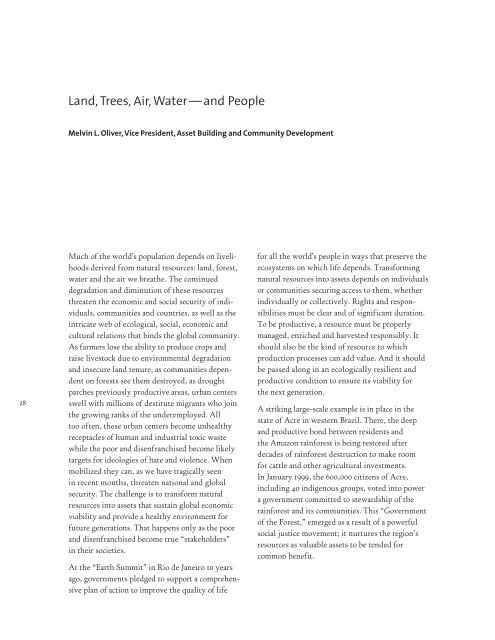2001 Annual Report - Ford Foundation
2001 Annual Report - Ford Foundation
2001 Annual Report - Ford Foundation
You also want an ePaper? Increase the reach of your titles
YUMPU automatically turns print PDFs into web optimized ePapers that Google loves.
Land, Trees, Air, Water—and People<br />
Melvin L. Oliver,Vice President, Asset Building and Community Development<br />
28<br />
Much of the world’s population depends on livelihoods<br />
derived from natural resources: land, forest,<br />
water and the air we breathe. The continued<br />
degradation and diminution of these resources<br />
threaten the economic and social security of individuals,<br />
communities and countries, as well as the<br />
intricate web of ecological, social, economic and<br />
cultural relations that binds the global community.<br />
As farmers lose the ability to produce crops and<br />
raise livestock due to environmental degradation<br />
and insecure land tenure, as communities dependent<br />
on forests see them destroyed, as drought<br />
parches previously productive areas, urban centers<br />
swell with millions of destitute migrants who join<br />
the growing ranks of the underemployed. All<br />
too often, these urban centers become unhealthy<br />
receptacles of human and industrial toxic waste<br />
while the poor and disenfranchised become likely<br />
targets for ideologies of hate and violence. When<br />
mobilized they can, as we have tragically seen<br />
in recent months, threaten national and global<br />
security. The challenge is to transform natural<br />
resources into assets that sustain global economic<br />
viability and provide a healthy environment for<br />
future generations. That happens only as the poor<br />
and disenfranchised become true “stakeholders”<br />
in their societies.<br />
At the “Earth Summit” in Rio de Janeiro 10 years<br />
ago, governments pledged to support a comprehensive<br />
plan of action to improve the quality of life<br />
for all the world’s people in ways that preserve the<br />
ecosystems on which life depends. Transforming<br />
natural resources into assets depends on individuals<br />
or communities securing access to them, whether<br />
individually or collectively. Rights and responsibilities<br />
must be clear and of significant duration.<br />
To be productive, a resource must be properly<br />
managed, enriched and harvested responsibly. It<br />
should also be the kind of resource to which<br />
production processes can add value. And it should<br />
be passed along in an ecologically resilient and<br />
productive condition to ensure its viability for<br />
the next generation.<br />
A striking large-scale example is in place in the<br />
state of Acre in western Brazil. There, the deep<br />
and productive bond between residents and<br />
the Amazon rainforest is being restored after<br />
decades of rainforest destruction to make room<br />
for cattle and other agricultural investments.<br />
In January 1999, the 600,000 citizens of Acre,<br />
including 40 indigenous groups, voted into power<br />
a government committed to stewardship of the<br />
rainforest and its communities. This “Government<br />
of the Forest,” emerged as a result of a powerful<br />
social justice movement; it nurtures the region’s<br />
resources as valuable assets to be tended for<br />
common benefit.

















